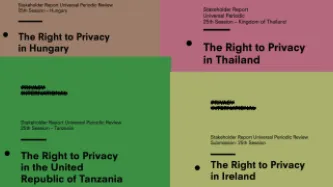Search
Content type: Examples
Under the country's emergency laws, on May 4 the Hungarian government announced it would suspend parts of GDPR and exempted authorities from key provisions such as subject access rights, the right to request erasures, and providing notice that personal information is being collected and stored as long as the data is being collected under the rubric of coronavirus-related health protection.
The changes will remain in place until the government declares the end of the emergency. Opposition…
Content type: Examples
The Hungarian government passed a law on March 30 granting Prime Minister Viktor Orbán the power to rule indefinitely by decree, which he said was essential to deal with the coronavirus crisis. The law also contained a provision under which those spreading false information about the pandemic could be punished with up to five years in prison. The legislation, which critics describe as shutting down democracy, comes at a time when many are concerned about the country's health service after years…
Content type: Examples
The Hungarian government is seeking to extend indefinitely the state of emergency it has declared because of the coronavirus epidemic. The extension, which was debated in the Hungarian parliament on March 23, would allow the government to rule by decree without parliamentary approval for as long as the government, which has a two-thirds majority in any case, thinks necessary, provide prison terms of up to five years for those convicted of spreading misinformation about the epidemic, and up to…
Content type: Examples
In November 2018, tests began of the €4.5 million iBorderCtrl project, which saw AI-powered lie detectors installed at airports in Hungary, Latvia, and Greece to question passengers travelling from outside the EU. The AI questioner was set to ask each passenger to confirm their name, age, and date of birth, and then query them about the purpose of their trip and who is paying for it. If the AI believes the person is lying, it is designed to change its tone of voice to become "more skeptical"…
Content type: Examples
As a part of Facebook’s efforts to curb disinformation and misinformation on its platform, the company introduced new rules over how political content is marked. This has resulted in content that is educational, news articles, and otherwise seemingly non-political being marked incorrectly and taken down. In Hungary (and Ukraine) this has caused frustration from newspapers, especially due to difference between how Western European papers are treated differently from others. The Guardian reports…
Content type: Examples
The Tel-Aviv-based private intelligence firm Black Cube, which is largely staffed by former Israeli intelligence operatives, was involved in a campaign to attack NGOs and businessman-turned-philanthropist George Soros during Hungary's election campaign. Between December 2017 and March 2018, agents using false identities secretly recorded the results of contacts with Hungarian NGOs and individuals connected to Soros. The recordings began appearing in the press three weeks before the election,…
Content type: News & Analysis
Over the next two weeks, the 25th session of the Universal Period Review Working Group will take place in Geneva. The Universal Period Review is a key mechanism of the UN Human Rights Council to remind UN Member States of their responsibility to respect and implement all human rights and fundamental freedoms.
Amongst others, Hungary, the United Republic of Tanzania, Thailand, and Ireland will be reviewed. Privacy International, in collaboration with national civil society…


